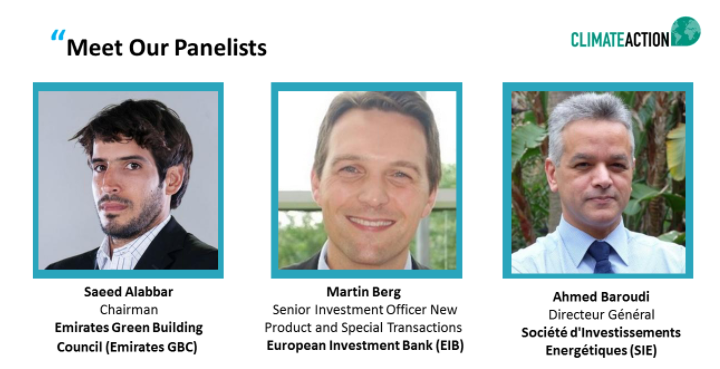Driving Sustainable innovation in MENA
A recent Climate Action webinar discussed the barriers and opportunities for sustainable innovation in the Middle East and North Africa (MENA) region

PRESS RELEASE - 27 October 2016, London, UK - A recent Climate Action webinar welcomed Saeed Alabbar, Chairman of the Emirates Green Building Council; Martin Berg, Senior Investment Officer at the European Investment Bank and Ahmed Baroudi, Director General of Société d’Investissements Energétiques (SIE) Morocco, to discuss the barriers and opportunities for sustainable innovation in the Middle East and North Africa (MENA) region.
Challenges and barriers
MENA constitutes a diverse region, representing countries with different languages, cultures and climate situations. Saeed Alabbar of the Emirates Green Building Council, evoked the lack of uniformity of the region as a challenge for collaboration between the different countries for sustainable innovation. Despite these differences Martin Berg of EIB highlighted the overarching vulnerability of the region to climate change impacts, insisting on the importance of investing in new ways to adapt to new climate realities.
Another key barrier is the difficulty in attracting private sector funding. Berg mentioned the general lack of project preparation in the region and emphasised the need for projects to reach a certain stage in order to be financeable. Therefore despite the great need for investment in climate adaptation and low carbon innovation, progress has been slow and risk perceptions remain high.
New tools to drive investment
Opportunities for investment in low carbon innovation however are beginning to grow. Berg almost 24 per cent of EIB’s none EU funding is spent in Mediterranean countries, which will expand with the Green for Growth Fund injecting more money into the region. The EIB is a key funder of the Ouarzazate project, which when complete will represent the largest CSP project in the world. This is alongside the African Development Bank and the Moroccan Government, creating a new fudning partnership for a project of flagship importance.
The Société d’Investissements Energétiques (SIE) based in Morocco works to facilitate private sector investment in low-carbon innovation and develop better cooperation between African countries. Ahmed Baroudi of SIE explained that directing this finance at SMEs in particular is a core aim of the organisation, as dynamic markets and local employment can be more rapidly accelerated by supporting local entrepreneurs.
These initiatives alongside the activities of the privately funded Afrcia Finance Corporation for example are bringing both national and regional scale projects to the region, creating an investment environment more attractive to international organisations.
Sponsored Content
The role of policy
Governments are beginning to put policies in place to facilitate increased funding and capture the benefits of green economic growth.
The example of the UAE was discussed by Saeed Alabbar, where buildings account for 80 per cent of electricity consumption- representing an economically appealing opportunity to reduce emissions and drive innovation. The government has expressed the will to peruse environmentally sustainable development and has adopted performance contracting schemes- new regulations to encourage energy efficiency retrofitting of buildings. Alabbar explained that the government backed Etihad Esco will support energy service companies and create a market for their services, with a view to drive down energy consumption by Dubai’s buildings by nearly 2Twh by 2030.
Alabbar also addressed the success of Masdar City, a real estate project built according to a sustainable design and low carbon principles. The project is a commercially viable example of energy efficient building for the MENA region, as well as a cleantech business zone which represents a hub and an incubation place for start-ups. Masdar also includes the Masdar Institute which conducts ground-breaking research on solar PV and renewables.
Moving forward
As the funding and policy conditions begin to align to facilitate low carbon innovation in MENA, Baroudi of SIE highlighted the importance of supporting the education and of training technicians and engineers that will truly embed green growth in the region. For Baroudi, the main priority is to develop strong human resources and make entrepreneurship an attractive opportunity- without which success will not be possible.
COP22 in Marrakech presents a huge opportunity for the region, especially Morocco that will host the conference next month. As global policy makers place a spotlight on low carbon development in the region, the impetus created should only accelerate the emergence of future opportunities.
Listen to the full webinar here and join us at the Sustainable Innovation Forum during COP22 to learn more!






